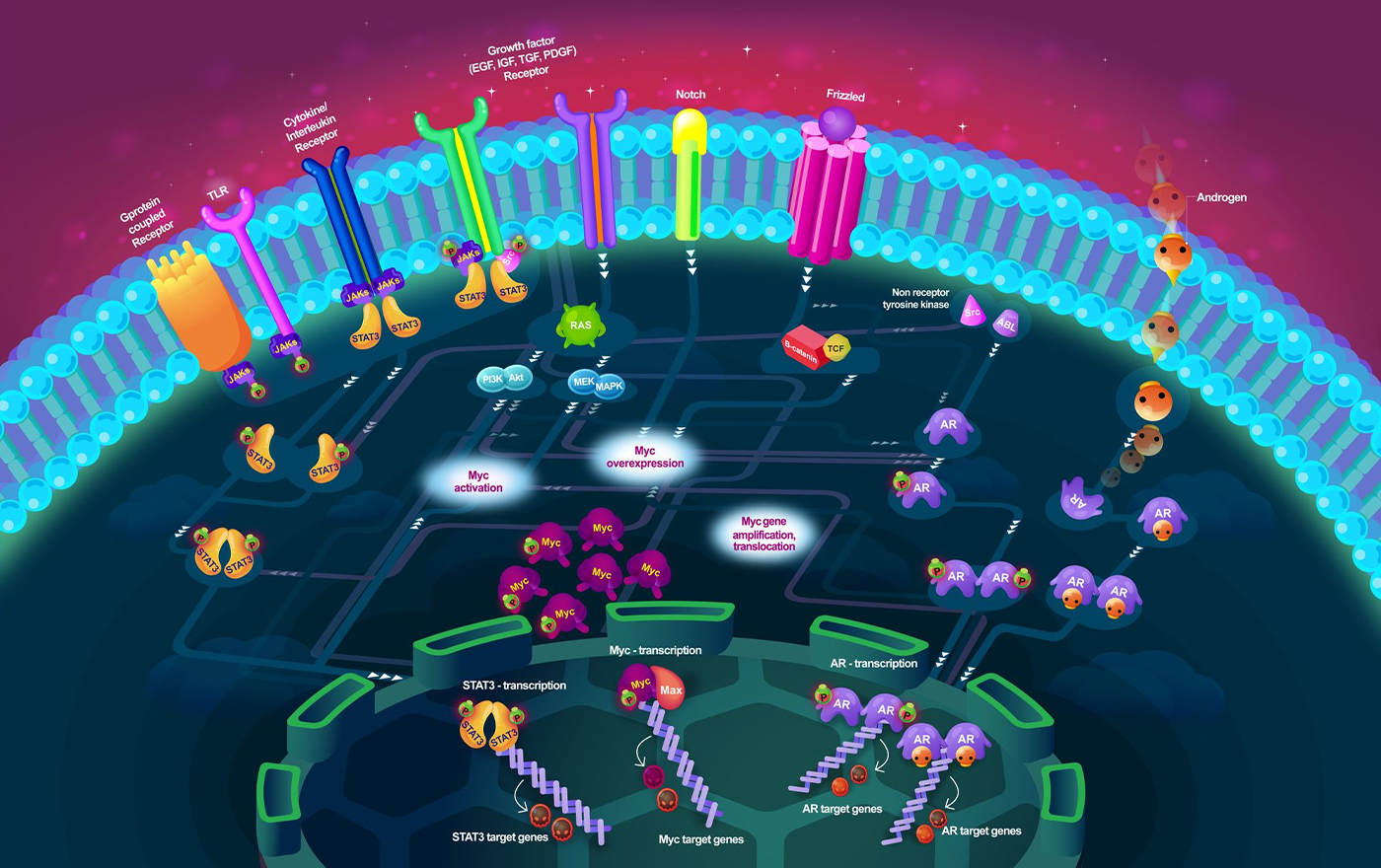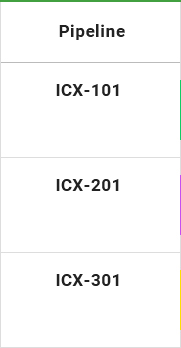R&D
Pipeline
Targeting a Transcription Factor is intrinsically challenging work. Firstly, the protein structure is known as undruggable, and secondly, the biology of cancer is not simple. One of the ultimate strategies to overcome those difficulties is to intervene between the TF proteins and the DNA. But we cannot apply our experiences from the development of other drugs such as tyrosine kinase inhibitors, since TFs have no chemical binding pocket that can interfere with the binding of DNA, which is a very large molecule. Moreover, without a deep understanding of the complicated network of the up and downstream of TFs, we cannot eliminate the concern of potentially deleterious side effects since TFs also work in normally proliferating tissues.
Incurix is applying its insight to such pipelines surrounding: the biophysics in Protein-DNA Interactions we found and the criteria of optimal candidates that make the target TF behave properly in the given cancer cell environment.

Pipeline Development Schedule (as of August 2023)

* Please move the screen left and right.
ICX-101: Myc inhibitor

 Myc-Max dimer to DNA*
Myc-Max dimer to DNA*
-
Myc
 Transcription Factor involving in stem cell growth and division
Transcription Factor involving in stem cell growth and division
- Rarely expressed in normal cells, overexpressed in cancer cells
- Induces cancer cell multiplication, anticancer drug resistance, and metastasis
- The company's lead product, ICX-101, is currently being studied in candidate optimization. To date, ICX-101 has demonstrated an excellent in vitro efficacy and safety profile.
Myc is a Transcription Factor that controls cell growth and survival and is deregulated in most human tumors. This oncogene constitutively and aberrantly express the Myc protein in over 70% of human cancers and drives multiple hallmarks of cancer. Many researchers have found that Myc is the main and central oncodriver, demonstrating that the direct inhibition of Myc leads to rapid tumor regression in mice. Hence, Myc has become one of the most wanted therapeutic targets in the oncology area. ICX-101 is a direct Myc inhibitor that inhibits the cMyc-Max dimer to bind to its consensus DNA sequence, E-box. It is a potent, selective, and orally available small-molecule inhibitor. ICX-101 has been shown to interfere with this protein-DNA interaction in vitro and inhibited tumor growth almost to regression in mice. Its selectivity for Myc was proven in EMSA and functional selectivity was confirmed by transcriptome analysis. Upon completion of structure optimization, we will be starting to conduct the first stage of GLP studies along with biomarker studies for the preliminary design of clinical trials planned for the end of 2023.
ICX-201 : STAT3 inhibitor

 STAT3 dimer to DNA*
STAT3 dimer to DNA*
-
STAT3
 A transcriptional regulator that controls cell development, survival, and immune functions
A transcriptional regulator that controls cell development, survival, and immune functions
- Overexpression of STAT3 in cancer cells promotes tumor formation, induces inflammation, and immune escape
- Optimal combination partner with immune anticancer agents
The receptor proteins in the cell membrane attempt to recognize the extracellular environment and then bind certain peptide molecules to transmit the signal to the nucleus through the intracellular signaling pathway. One of the key proteins in these pathways is the Signal Transducer and Activator of Transcription 3 (STAT3). The signals transmitted by STAT3 mediate the expression of various genes and play a key role in many cell processes, including cell survival, growth, division, pluripotency, and apoptosis, as well as not triggering the immune system.
We are currently developing Lead Product ICX-201, a potent STAT3 selective inhibitor for the treatment of cancer. From the beginning of the ICX-201 project, we selected the lead candidates that interfere with the binding between STAT3 and DNA, not STAT1. This approach is possible because we selected the molecules that inhibit the interaction of STAT3 with DNA rather than the dimerization of STAT3. In recent in vivo studies, Oral administration of ICX-201 was shown to inhibit tumor growth by unlocking the immunosuppressive function of immune cells and inducing apoptosis in tumor cells. We plan to derive the best lead compound by the end of this year.
ICX-301: Androgen Receptor inhibitor

 AR dimer to DNA
AR dimer to DNA
-
Androgen Receptor (AR)
 Upon binding androgenic hormones, acts as a transcriptional factor that regulates genes critical for the development and maintenance of the male sexual phenotype
Upon binding androgenic hormones, acts as a transcriptional factor that regulates genes critical for the development and maintenance of the male sexual phenotype
- Aberrant Androgen receptor activity leads to the progression of prostate cancer
- Key therapeutic target in prostate cancer
Prostate cancer is the second most commonly occurring cancer in men and the fourth most commonly occurring cancer overall. Androgen deprivation therapy (ADT), which lowers the level of testosterone, has been the standard of care for this cancer across different stages. Initial ADT achieves responses in nearly all patients; however, the vast majority of responsive patients will ultimately become resistant, resulting in a poor prognosis for men diagnosed with this devastating condition. Castration-resistant prostate cancer (CRPC) is a form of advanced prostate cancer. With CRPC, the cancer no longer completely responds to ADT. Currently, enzalutamide and abiraterone, which are the 2nd generation of ADT, have been beneficial for some patients, but resistance mechanisms reduce their efficacy, including increased levels of androgen production, increased AR gene, and enhancer expression, AR point mutations, and alternative slicing AR variants.
We are developing ICX-301, a potent, selective, and orally available small-molecule inhibitor of the pan-AR to treat prostate cancers. It does not involve testosterone but instead travels to the region where the Androgen receptor binds to its DNA and disrupts their interaction. No matter whether the AR is with its ligand or not, it blocks the last entry gate to the DNA binding site and can simply silence the transcriptional activity.
In vitro and in vivo studies show it reduces the expression level of major target proteins, PSAs, and leads to cell growth inhibition. By inhibiting AR binding to DNA directly, it doesn’t need to destroy the AR protein nor intercalate into the DNA, so there is no concern of compensating feedback in AR protein expression or non-specific DNA intercalation.
ICX-301 was selected for the KDDF(Korea Drug Development Fund) national project in 2023 and plans to focus on developing candidate drugs. We plan to optimize our leads and initiate a GLP study in 2nd half of 2024.


